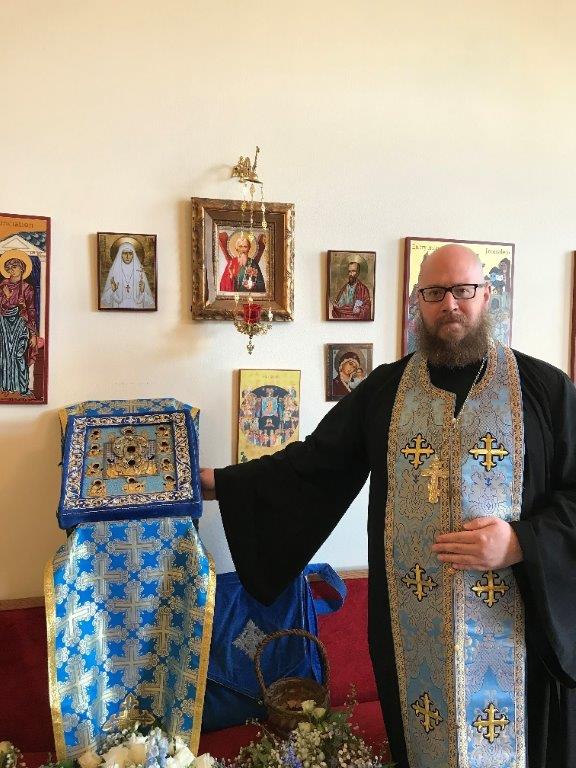
– Fr. Ignatius, are you a native Texan?
Sort of – I was actually born in Des Moines, Iowa, but I grew up between there and San Antonio, Texas since my dad was a television meteorologist and moved us back and forth several times while I was growing up. I will always consider San Antonio my home town and am Texan to the bone!
– How did you become interested in Orthodox Christianity?
I had been an Anglican priest for several years and moved into an administrative role, but as I began rereading the Acts of the Apostles and Early Church Fathers I realized I wanted to be a part of the original Church – and the Anglican Church was pretty far-removed from that. I petitioned to be admitted to ROCOR under the Western Rite provision, then into the East, and the rest is history!
– Why did you decide to join the Russian Orthodox Church rather than another archdiocese?
I did quite a bit of research on the various jurisdictions, and ROCOR seemed to be the best fit in terms of welcoming non-Russian clergy and their families, as well as presenting the liturgical life of the Church in its entirety, i.e., not skipping or abbreviating any services of aspects thereof. We were also made to feel very welcome and loved at the nearest parish to us, Holy Protection in Pflugerville, where I was taught the Liturgy of St. John Chrysostom by the then rector, Fr. Aidan.
– I know that your family is also Orthodox. Was it natural and easy for Matushka to become Orthodox?
Matushka’s family is Volga-Deutsch, and her father speaks both Russian and German, and a lot of the foods we enjoy were ethnically Russian from her having grown up in that tradition, so it was a pretty easy transition. While we both grew up Roman Catholic, we were very disappointed to see the liberal/ progressive direction the Roman Church was headed in, so conversion came very easily and naturally to us. Following my ordination I came home and chrismated Matushka Apollonia and our son Job (Jake); when Anna (Mo) was born, she was baptized and chrismated into the church as our parish’s first “cradle” Orthodox.
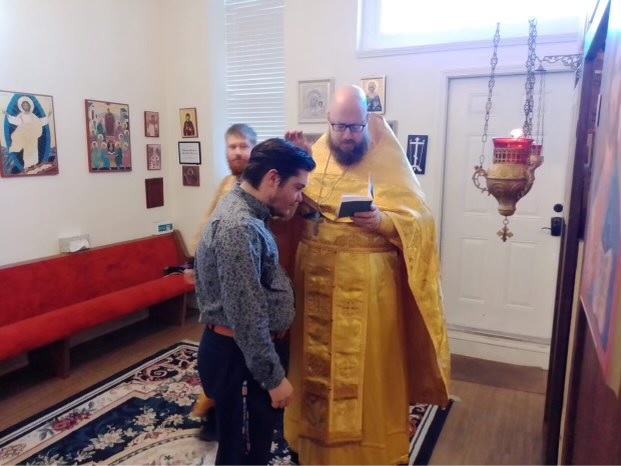
– How did St. Andrew’s church start? Who picked the patron saint for it?
St. Andrew’s started with a portable sterlite tote with a chalice and diskos from India (that we still use – about to be replaced and sent to a new mission), a single small icon of Christ, a single epitrachelion, and a Gospel book – we would set up literally anywhere people would let us, and for quite a while it was just my family and I. When we finally got a space of our own about 3 years ago, our first “iconostasis” was two canvas prints of Christ and the Theotokos, set up on folding chairs; the “altar” was a folding card table set up on bed risers (to account for my height – I’m 6’5″/ 1.96m). Matushka and I built the church literally piece by piece from the ground up, mostly on weekends, since we both teach full time also; a bench here, a kliros there, all of it coming together for a little over a year to where we are now, and I’m still building pieces as they’re needed. It’s amazing now to walk in and see all that’s there, when I remember all too well the empty space we started in, and the days of toting the tote before that…
I chose St. Andrew the First-Called because I thought it was appropriate here in the middle of a bunch of Roman Catholics and Baptists, that the first Orthodox Church should be named in honor of the first Disciple. Since we moved into the space in late November of 2017 our very first Divine Liturgy was the Feast of St. Andrew, and I was grateful to be joined by a few other priests of the diocese. In 2019 it was our honor to host Archbishop Peter for our feast day, as well as four other priests from the surrounding area, and dozens of the faithful.
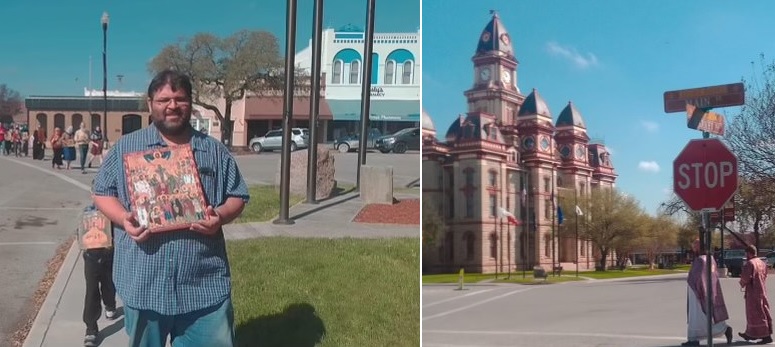
– How old is St. Andrew’s church?
I was ordained a priest by Metropolitan Hilarion at St. Nicholas Monastery in North Fort Myers, Florida (sadly since stolen by schismatics) on August 31, 2013, so in a sense that was the beginning of St. Andrew’s. As we approach our eighth year it is amazing to me to see how much we’ve grown both physically and spiritually, and I’m proud to say that we’re now a recognized fixture in our community, as we are right on the courthouse square and have regular processions to bring attention to Holy Orthodoxy!
– You are a father both as a Priest and as a parent. Are there similarities and differences in these types of fatherhood?
It’s funny, because I felt a call to the priesthood long before I was a parent, and my interest in starting a mission was initially a bit selfish – I wanted a place to worship and in which to bring up my children in our Faith. Over the last several years I have gained several spiritual children (several of whom are quite a bit older than I am), and it’s the same sort of love and caring and wishing for their wellbeing, but still a little bit different. As a parent I have to be a disciplinarian, and that’s sometimes true of spiritual children as well; most of all, I hope I serve as a good example to my children of both types, I hope they know they are loved, and I hope that they see that I make mistakes as well, and that we are all called to learn from them and do better as we work through life and faith.
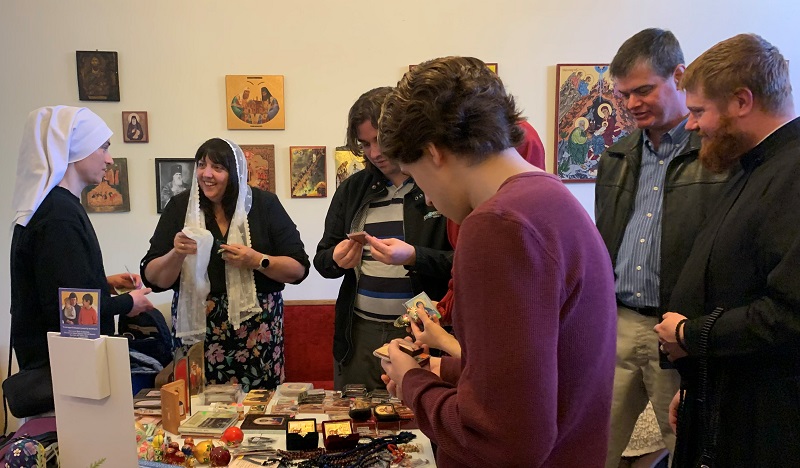
– What do you enjoy the most about fatherhood?
My favorite thing about fatherhood is introducing my children to new things and seeing the sense of wonder in their eyes. When I’m teaching, I call these the “aha” moments – when an elusive concept is first firmly grasped by my student, and it’s the same with my own children. They’re reaching an age where they’re deciding for themselves what their lifelong interests are going to be, and getting to experience them exploring their world and learning new things is a gift.
– What is the most difficult part of fatherhood for you?
The most difficult aspect of fatherhood for me is being away from my children for any length of time. Because I’m a bi-vocational, non-stipendiary priest, I work two secular jobs in order to support both my family and my ministry. Let me be clear – I became a priest to serve God, not to get paid, so I don’t mind that at all, and if I were to receive a stipend I’d only use it to support the mission anyway. In addition to my job as a college professor (I teach Philosophy, Ethics, and Religion) I also work as a business process improvement specialist/ consultant, and this requires that I travel about 40% of the time, usually for a week at a time. While I miss Matushka and the kids, it’s always a happy homecoming to return to them at the end of those work weeks.
– Tell us a little about your children. How old are they? What is your favorite thing to do with them?
My son, Jake (Job in the Church) is 9, a fourth grader, and enthusiastic reader, gamer, and outdoorsman – he enjoys shooting his bow and arrows, skateboarding, and riding BMX. My daughter, Mary Opal (We call her “Mo,” Anna in the Church) is 6, a first grader, and loves to sing, play with her animals and barbies, and try to keep up with her brother. Both are avid gymnasts, and both enjoy helping us around the rectory, gardening, cooking, and taking care of our several pets. My favorite thing to do with them is still to read to them at night – we read every night, and I have since they were infants – our home has books in just about every room and we encourage them constantly to be voracious readers as Matushka and I are.
– In what ways are your children similar to you?
Matushka would probably say that they’re both stubborn and self-assured, but that could have come from either one of us. Both are fascinated by the world as I am, always in a relentless pursuit of new knowledge and experiences, and they do their very best to share the things they love with those around them.
– What do they enjoy the most about you?
Matushka is a competitive speech and debate coach, so she’s gone on quite a few weekend nights during the year, and the kids and I are #DebateBachelors – usually this means we all get through the shower early, either make or order a pizza, and watch a movie together in our pajamas. It’s been this way since they were infants, and it’s become something of a tradition for us – something special that we do together. That, and the nightly reading – they especially enjoy Dr. Seuss because I do my best to keep up with the rhyming, and change my voice for theatricality.
– What kind of a kid were you when you were a boy? Were you quiet and contemplative or active and sporty?
I was a bit of both – I’ve always been a reader, and believe it or not, I’m a bit of an introvert when I don’t have to be extroverted for church services or my lectures. I was perfectly at home spending the entire day with a good book – especially Robert E. Howard and Edgar Rice Burroughs, but was also happy tromping through the woods and building things with my dad. I was a martial artist from a young age, and hold a few black belts, was a gymnast until I got too tall to tumble, fenced (sabre), and swam competitively all through high school, college, and graduate school.
– What was your most memorable Father’s Day gift?
We tend not to do Father’s and Mother’s Day gifts, usually opting instead for experiences the whole family can participate in. We especially like going out to Fredericksburg and Brenham, and of course, “home” to San Antonio to see the sights and eat at restaurants I grew up going to. Since my children are the reason I get to celebrate Father’s Day, I really like to spend it doing something with them, and of course, spending time with my own father, Mike (Mikhail), and my mother, Fran (Natalia) who entered the Church a few years ago.
– What would you like to say to the Russian community of Austin?
I would like to invite the Russian community of Austin to please come and visit St. Andrew’s in Lockhart! Come outside of a fasting time, since we’re within walking distance to all of the world-famous BBQ restaurants that put our little town on the map, but really come any time for a very warm welcome. We’re a small mission, but we’re rapidly growing – services are mostly in English, with a little Church Slavonic, and we have several Russian speakers ready to welcome visitors. Most of all we need the active participation of the larger community to help us to continue to grow and to thrive, and to introduce the beauty of Russian Orthodoxy to central Texas!
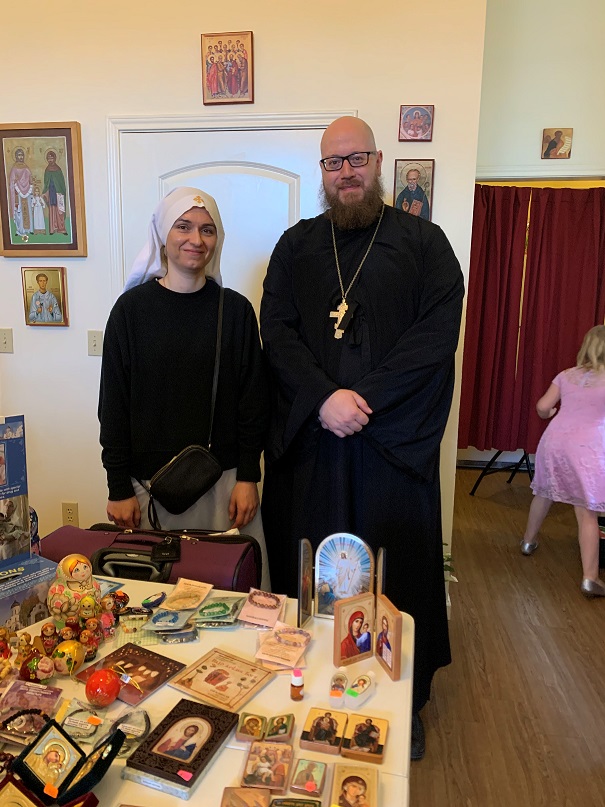
Editor: Olga Falkowski
Publisher: Russian Cultural Center
